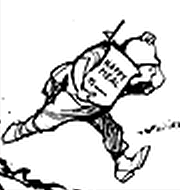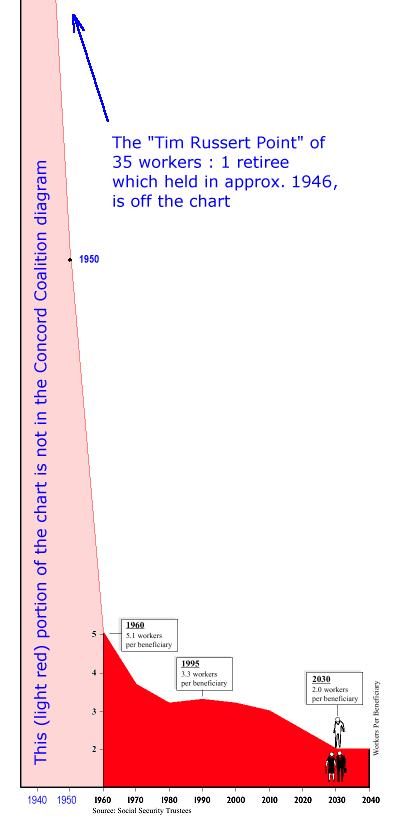Friday, September 27, 2002
Everything but the kitchen sink: The White House has helpfully provided a document to bolster its case for going after Iraq. Called A Decade of Deception and Defiance, one of its chapters is Saddam Hussein's Refusal to Return Stolen Property. Which reads in full: Iraq destroyed much stolen property before it could be returned, and Kuwait claims that large quantities of equipment remain unaccounted for:The UN and Kuwait say Iraq has not returned extensive Kuwaiti state archives and museum pieces, as well as military equipment, including eight Mirage F-1 aircraft, 245 Russian-made fighting vehicles, 90 M113 armored personnel carriers, one Hawk battery, 3,750 Tow and anti-tank missiles, and 675 Russian-made surface-to-air missile batteries.
posted by Quiddity at 9/27/2002 11:29:00 PM
0 comments
Who said what? Match the writers: Michael Kelly in The Washington PostCharles Krauthammer in The Washington Post Oliver North in Townhall.comAndrew Sullivan in SalonAndrew Sullivan on his website (1 & 2) with the comments about Gore or his speech: | A | someone who cannot be considered a responsible aspirant to power, dishonest, cheap, low, hollow, breathtakingly hypocritical, wretched, vile, contemptible, lie, mendacity, viciousness, a disgrace | | B | bitter and negative, not even honest, a political coward, disgusting, outrageous smear against the administration, weasely, Chomsky-like critique, weasels around, naked opportunist | | C | can't make peace with the concepts of truthfulness and honesty, wrong, mean-spirited, outrageous claims | | D | a disgrace, cheap shots, without logic or coherence, ad hominem, poison, profoundly unserious, cynical | | E | faking, a pure opportunist, no consistency in his political views, say whatever he thinks will get him power or attention or votes, bizarre, pathetic, bellicose hysteria | Answer (highlight with cursor from here): A: Kelly, B: Sullivan (Salon), C: North, D: Krauthammer, E: Sullivan (website)(to here)
posted by Quiddity at 9/27/2002 07:31:00 AM
0 comments
Thursday, September 26, 2002
Readin' the news: We took a look at this Reuters news item about Iraq - al Qaeda ties. And note the following: Speaking at the Pentagon Rumsfeld said there was "solid evidence" of the presence in Iraq of al Qaeda members.
"We have what we believe to be credible information that Iraq and al Qaeda have discussed safe haven opportunities in Iraq, reciprocal non-aggression discussions. We have what we consider to be credible evidence that al Qaeda have sought contacts in Iraq who could help them acquire weapons of mass destruction capabilities," Rumsfeld told reporters. That's pretty weak. "Discussions," and "seeking contact." But this was strange: One report, he said, indicated Iraq had provided unspecified training related to "chemical and/or biological matters" to al Qaeda, blamed by Washington for the Sept. 11 attacks on America that killed around 3,000 people. Blamed by Washington? What's Reuters up to? Is there still no hard evidence that al Qaeda was behind the Sept. 11 attack? In fact, what is the evidence? We know bin Laden took credit, but has anybody reconstructed the command-and-control network to show that the 19 hijackers were "officially" part of al Qaeda? Our default position is that al Qaeda was responsible, but we don't recall any details other than the movements of the hijackers themselves. For all we know, the hijacking could have been a pure Saudi-centered operation, or an Iraqi one, or an Iranian one, or...
posted by Quiddity at 9/26/2002 06:32:00 PM
0 comments
Barlow on Freud: Ted Barlow has some excellent comments about Freud and the scientific method. We completely agree with Ted's views in this matter. With Freud's work, there was no way to test it since it was wholly dependent on subjective evaluations. However, Freud fans still exist, even at the highest levels. Take, for instance, Eric Kandel, winner of the 2000 Nobel Prize for Medicine for contributions to the field of neuroscience. We heard him praise Freud some time ago on the Charlie Rose show. And as this report from October 2000 puts it: The news last week from Stockholm that Eric R. Kandel of Columbia... had won the 2000 Nobel Prizes in physiology and/or medicine for ... work on the biochemical basis of learning, mood, and memory would have made Sigmund Freud proud. Kandel [and others] have largely realized Freud's hope that such higher mental faculties as mood, memory, and desire might be reduced to their chemical bases. The Nobelists had proved that one of Freud's heroes, the materialist Ludwig Büchner, was right when he announced that ?ohne phosphor keine Gedanke? (without phosphorous no thought). Nerve cells use phosphorus to send us their news. and Eric Kandel grew up wanting to be Sigmund Freud. To this day, he spends summers amidst the shrinks and scholars of Wellfleet, Massachusetts, rather than among the sea-slug students of Woods Hole or Cold Spring Harbor. So, a hard-science, reductionist investigator thinks highly of Freud. Go figure. Apparently Freud did opine at one point that biological explanations for mental conditions would eventually be found, but his work was more in the spirit of the 19th century's Romantic Era ("id," anyone?) than anything else.
posted by Quiddity at 9/26/2002 06:17:00 PM
0 comments
Slogan for our time: From the fertile mind of Karl Rove: 
posted by Quiddity at 9/26/2002 02:19:00 PM
0 comments
A head-scratcher: Tony Blair's strong support of Bush's policies about Iraq make us wonder. Sure, it's a serious foreign policy issue and Britain has national interests. But Blair has to be aware that he's also doing plenty to support Bush and the Republicans - politically. Seeing Blair on every news program hailing Bush's stance must be the equivalent of millions of dollars of political ads. While we don't have exact numbers, it's our impression that Blair got more media exposure for his recent Iraq-is-a-threat statements than Gore did for his speech in San Francisco. Nations have interests in the outcome of elections in other states (witness the recent U.S. - Germany spat). What is it that makes a Republican-controlled United States good for England? We have no idea.
posted by Quiddity at 9/26/2002 06:58:00 AM
0 comments
Andrew Sullivan to open miniature golf course: For adults' eyes only. See it here.
posted by Quiddity at 9/26/2002 06:25:00 AM
0 comments
The President speaks: From the Q&A when Bush was with the Colombian President: Terry Moran. Q: Mr. President, are you politicizing the war? Do you think Americans should base their vote in November in part on where a candidate stands on the war?
PRESIDENT BUSH: I think the American people ought to understand that life has changed here in this country; that it used to be two oceans would separate us from danger, that we were quite comfortable in our shores knowing that it would take an unusual circumstance to be attacked. After September the 11th, we were attacked, and the American people understand that this country must deal with the true threats.
I am as determined today as I was on September the 11th to pursue an enemy which still wants to hurt America. I am absolutely determined to make sure that 10 years from now we don't look back and say, what happened, why did America go soft, why did we ignore true threats that face our people?
And I hope the American people understand that. I was concerned, of course, after September the 11th, that as time went by, some might forget, some might forget the true threats. Of course, I'm reminded of that every day when I come here to the Oval Office that we face true threats. And, Terry, my job is to protect the American people. It's my most important job, most important assignment I have. And I will continue to do that, regardless of the season.
Q: So it's a legitimate political issue?
PRESIDENT BUSH: Legitimate national security concern is what it is. You may try to politicize it. I view it as my main obligation; that is to protect the American people. It's the most important job this President will have, and it's the most important job future Presidents will have, because the nature of war has changed. We note the following: Bush is right, it used to be two oceans separating the U.S. from danger, up until about 1970.What's this true threats business?Good to know that Bush will continue to protect the American people, regardless of the season.And apparently protecting the American people wasn't going to be the most important job for future presidents until the nature of war changed (on Sept. 11) Crazy.
posted by Quiddity at 9/26/2002 05:56:00 AM
0 comments
What's that bag? In today's Danziger cartoon, it's not clear what that soldier is carrying. Here's a close-up  posted by Quiddity at 9/26/2002 12:43:00 AM
posted by Quiddity at 9/26/2002 12:43:00 AM
0 comments
Takin' a look at the The National Security Strategy of the United States of America: Available from the White House website. Some of it made sense. Some of it didn't. Here are a few items of interest: | From the document | Our comments | | Chapter 1 Overview of America's International Strategy | | | For most of the twentieth century, the world was divided by a great struggle over ideas: destructive totalitarian visions versus freedom and equality. That great struggle is over. The militant visions of class, nation, and race which promised utopia and delivered misery have been defeated and discredited. | There's still religion | | The U.S. national security strategy will be based on a distinctly American internationalism that reflects the union of our values and our national interests. The aim of this strategy is to help make the world not just safer but better. | American exceptionalism lives. | | ... the United States will: expand the circle of development by opening societies ... | So, we will be intervening? | | Chapter 2 Champion Aspirations for Human Dignity | | | America must stand firmly for the nonnegotiable demands of human dignity: the rule of law; limits on the absolute power of the state; free speech; freedom of worship; equal justice; respect for women; religious and ethnic tolerance; and respect for private property. | No mention of democracy - although further down it's stated that it will be "rewarded" and is something "we cherish." | | Chapter 3 Strengthen Alliances to Defeat Global Terrorism and Work to Prevent Attacks Against Us and Our Friends | | | The struggle against global terrorism is different from any other war in our history. | The Barbary Pirates come to mind ("an unconventional foe") | | We will disrupt and destroy terrorist organizations by: supporting moderate and modern government, especially in the Muslim world, to ensure that the conditions and ideologies that promote terrorism do not find fertile ground in any nation | Looks like a clash of civilizations from here. | | Chapter 4 Work with others to Defuse Regional Conflicts | | | In the Western Hemisphere we have formed flexible coalitions with countries that share our priorities, particularly Mexico, Brazil, Canada, Chile, and Colombia. | !! | | Chapter 5 Prevent Our Enemies from Threatening Us, Our Allies, and Our Friends with Weapons of Mass Destruction | | | For centuries, international law recognized that nations need not suffer an attack before they can lawfully take action to defend themselves against forces that present an imminent danger of attack. Legal scholars and international jurists often conditioned the legitimacy of preemption on the existence of an imminent threat—most often a visible mobilization of armies, navies, and air forces preparing to attack. | But responding to mobilization was the cause of WWI, and was later judged to be ill-advised. | | The United States will not use force in all cases to preempt emerging threats, nor should nations use preemption as a pretext for aggression. | The new global debate? Preempting emerging threats vs. unwarranted aggression. | | ... in an age where the enemies of civilization openly and actively seek the world’s most destructive technologies, the United States cannot remain idle while dangers gather. | So it is a clash of civilizations (sort of). | | Chapter 6 Ignite a New Era of Global Economic Growth through Free Markets and Free Trade | | | "When ... opportunity is hoarded by a privileged few, no amount ... of development aid is ever enough." President Bush, Monterrey, Mexico, March 22, 2002 | No kidding. Bush knows what it's like to be a member of "a privileged few" | | We will use our economic engagement with other countries to underscore the benefits of policies that generate higher productivity and sustained economic growth, including: tax policies—particularly lower marginal tax rates—that improve incentives for work and investment; | This is absurd. Tax rates have a relationship to the amount of government services the people want. To insist otherwise is to interfere with a state's domestic policies. | | We will strengthen our own energy security and the shared prosperity of the global economy by working with our allies, trading partners, and energy producers to expand the sources and types of global energy supplied, especially in the Western Hemisphere, Africa, Central Asia, and the Caspian region. | Will somebody please note this item? | | Economic growth should be accompanied by global efforts to stabilize greenhouse gas concentrations associated with this growth, containing them at a level that prevents dangerous human interference with the global climate. Our overall objective is to reduce America’s greenhouse gas emissions relative to the size of our economy, cutting such emissions per unit of economic activity by 18 percent over the next 10 years, by the year 2012. Our strategies for attaining this goal will be to: promote renewable energy production and clean coal technology, as well as nuclear power—which produces no greenhouse gas emissions, while also improving fuel economy for U.S. cars and trucks; | Coal has the highest CO2 output of all the fossil fuels. In this document no-greenhouse-gas nuclear and big-greenhouse-gas coal is promoted at the same time. Also, it will be interesting to see when - if ever - the administration promotes higher vehicle fuel economy. | | Chapter 7 Expand the Circle of Development by Opening Societies and Building the Infrastructure of Democracy | | | Literacy and learning are the foundation of democracy and development. | Only mention of democracy in the chapter. | | For the first time, donors can link a portion of their contributions to [International Development Association] to the achievement of actual development results, and part of the U.S. contribution is linked in this way. | That's a formula for cutting back funding. | | Chapter 8 Develop Agendas for Cooperative Action with the Other Main Centers of Global Power | | | The United States has undertaken a transformation in its bilateral relationship with India based on a conviction that U.S. interests require a strong relationship with India. ... We have a common interest in the free flow of commerce, including through the vital sea lanes of the Indian Ocean. | What sea lanes? Unlike Northern Europe, the Mediterranean Sea, Bosporus, Red Sea, and Persian Gulf, there are no choke points in the Indian Ocean. What are they thinking? | | Chapter 9 Transform America's National Security Institutions to Meet the Challenges and Opportunities of the Twenty-First Century | | ... our military must: dissuade future military competition;
Our forces will be strong enough to dissuade potential adversaries from pursuing a military build-up in hopes of surpassing, or equaling, the power of the United States. | That's the way you dissuade competition: just be strong "enough" - no diplomacy required. | | ... to meet the many security challenges we face, the United States will require bases and stations within and beyond Western Europe and Northeast Asia | Are we going back to the Philippines? | | The war on terrorism is not a clash of civilizations. It does, however, reveal the clash inside a civilization, a battle for the future of the Muslim world. This is a struggle of ideas and this is an area where America must excel. | It's hard to see how America can have much say about a dispute within the Muslim world. |
posted by Quiddity at 9/26/2002 12:06:00 AM
0 comments
Wednesday, September 25, 2002
Economics 101: In Bush's New Jersey speech, the one where he said the Senate was "not interested in the security of the American people", he also said: In order to make sure the country was stronger, I pulled this page out of the economic textbook, the page that says, if you let people keep more of their own money, they're going to spend it on a good or a service. If they spend it on a good or a service, somebody will produce the good and service. And if somebody produces a good or service, some American is more likely to find work. The tax relief came right at the right time for economic growth and jobs. Bush is wrong. Money can sit around, not circulating. The textbook Bush used must have been printed before 1930.
posted by Quiddity at 9/25/2002 10:12:00 PM
0 comments
Tuesday, September 24, 2002
Just one word: We have only one word to describe the new defense policy announced by the Bush administration: reckless
posted by Quiddity at 9/24/2002 02:57:00 PM
0 comments
Monday, September 23, 2002
Enough already!!!
 | We draw your attention to something Tim Russert said yesterday: " ... there used to be 35 workers for every retiree. There’s soon to be two workers for every retiree. " Here are the facts: - President Franklin Roosevelt signed the Social Security legislation in 1935. link
- In 1945, a decade after Social Security was implemented we had 40 workers for every retiree. link
- In 1950, there were 16 workers for every retiree. link
- In 1960, there were 5.1 workers per retiree. link
- In 1970, there were 3.5 workers for every retiree. link
- In 1980, there were 3.2 workers for every retiree. link
- In 1995, there were 3.3 workers per retiree. link
- The ratio in 1998 is slightly more than three workers per retiree. link
- By the year 2030, there will be fewer than two workers contributing to Social Security for each retiree. link
By Russert's logic, we should have had a crisis in 1950, 1960, 1970, 1980, 1995 - 'cause there were a whole hell of a lot fewer workers than 35 per retiree. Obviously, when a pay-as-you-go program is first started, the ratio of pay-in's to pay-out's is going to be very large. However, Russert tosses around 35:1 as if that's the ratio for a settled, steady-state system. And another thing. We've heard about how much more productive U.S. workers have become over the last 50 years. You know, more output per unit worker. That's true, and a reason why over time, fewer workers are needed to build a car, publish a book, or support a retiree. Now, there are real issues having to do with the Baby Boomer demographics which require building up a surplus to tap into later, and certain other adjustments. But when people like Russert talk about 35 workers per retiree - and contrast that with an expected 2 per retiree, that's shorthand for implying that the system is hoplessly broken. And that's a lie. |
posted by Quiddity at 9/23/2002 11:58:00 AM
Sunday, September 22, 2002
Tim Russert carrying water for the Republicans: From this Sunday's Meet the Press transcript: [Speaking to Wayne Allard, incumbent Republican senator from Colorado.]
MR. RUSSERT: Senator Allard, you have suggested creating private accounts in Social Security.
SEN. ALLARD: Yes.
MR. RUSSERT: Some call that privatizing.
SEN. ALLARD: Yeah. Yeah.
MR. RUSSERT: Democrats prefer that term. Republicans object to it.
posted by Quiddity at 9/22/2002 10:20:00 PM
0 comments
Amazing what a single issue can do for your political prospects: | ISSUES BREAKDOWN | | favor Democrats | no traction | favor Republicans | - Stagnant economy
- Plunging 401k's
- Corporate scandals and Bush administration connections
- Failure to regulate rigged/failed electricity market
- Federal deficits
- Social Security
- Reductions in Medicare payments (proposals for)
- Prescription drugs
- Drought in several states (administration's lack of response)
- Environment (Kyoto, EPA, ANWR)
- "getting back" for the 2000 election
(Bush not the popular choice, Florida) | - Crime
- Trade issues
- Judiciary
| |
posted by Quiddity at 9/22/2002 02:27:00 PM
2 comments
What's the fuss?  | People are talking about that mom who slapped her daughter in a parking lot. Everybody is outraged. Or are they? Maybe that sort of thing is just the ticket in Florida. Consider that the man named on August 15 by Gov. Jeb Bush to head Florida's child welfare agency, Jerry Regier, is an evangelical Christian who views spanking that causes ''bruises or welts'' as acceptable punishment. About the little girl. The AP reports that: The girl showed no visible signs of injuries. So, according to Jeb's appointee, a parent would be perfectly justified beating a child even harder than the Indiana mom did. |
posted by Quiddity at 9/22/2002 08:49:00 AM
0 comments
In case you missed it: We are pleased to report that that adulterous Nigerian woman is not going to be stoned to death. (At least the odds are very good that she won't.) The government of Nigeria, facing increased scrutiny because it will be hosting this year's Miss World contest, has decided to get involved. The BBC reports: In a letter published on the Miss World website, Nigeria's Minister of State for Foreign Affairs Dubem Onyia says " no woman has ever been punished in such a dastardly manner...and this will not be an exception". Who said beauty contests were worthless?
posted by Quiddity at 9/22/2002 08:17:00 AM
0 comments
It keeps on going and going: This Sunday, the topic on D. James Kennedy's widely viewed Coral Ridge Hour was America Remembers. It was about September 11. The reverend discussed flight 93, the individuals that died in New York and Washington, and the efforts of the police and firefighters. He spoke of Osama bin Laden's delight upon learning the news of the attack. Then he turned to how Americans were handling the memory of that day. He spoke about what to tell children at home and in the schools. Then he said: From the NEA the order went out, "not to blame anyone" Thanks, Washington Times! |  |
posted by Quiddity at 9/22/2002 08:04:00 AM
0 comments
|